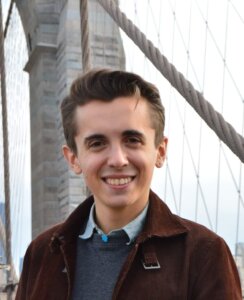Jacob’s Ladder is making Jewish bluegrass music from the ‘Eretz’ up
The all-American folk trio recently performed in Canada
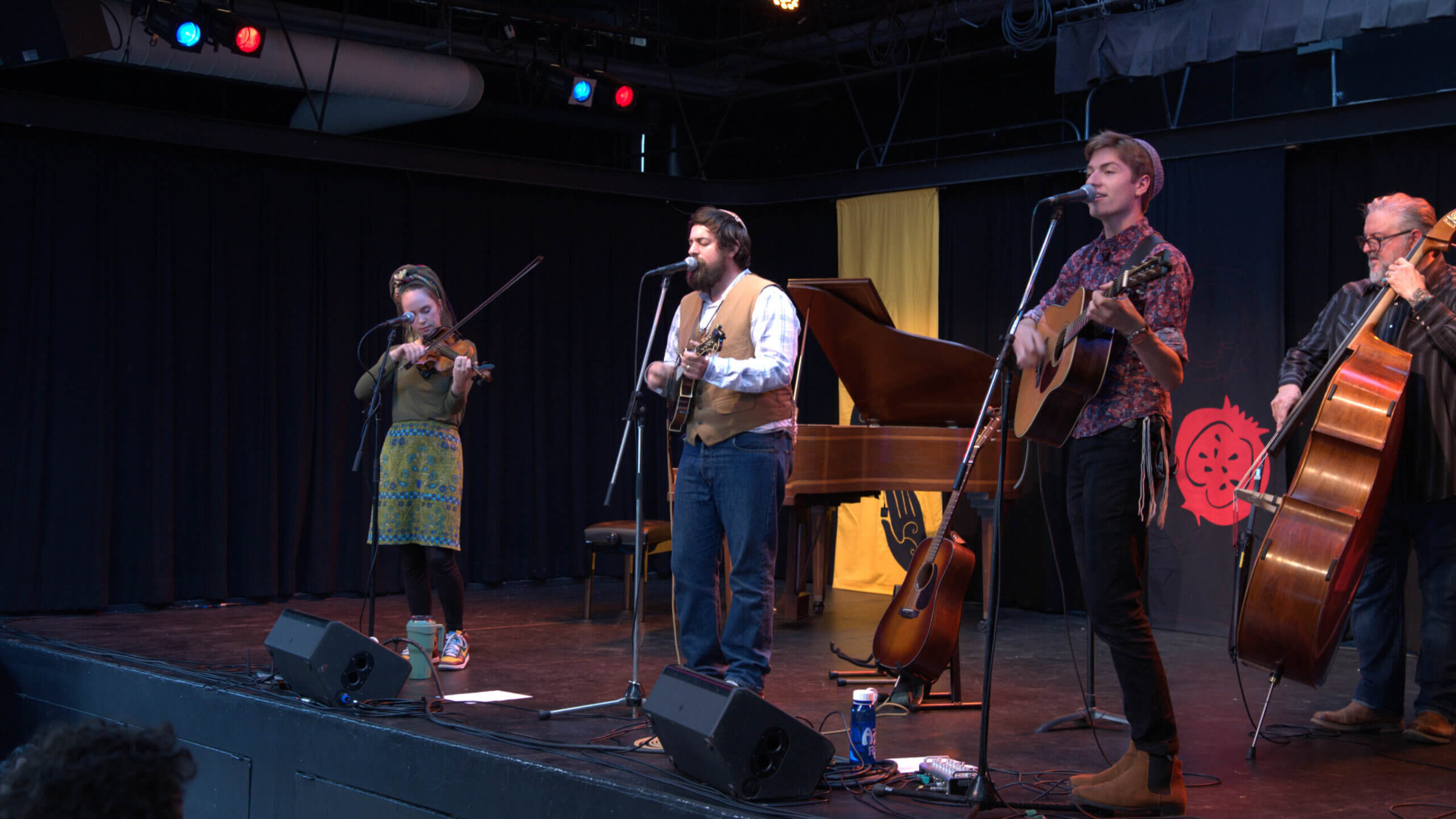
From left to right, Sofía Chiarandini, Ariel Wyner and G Rockwell perform at the Ashkenaz Festival in Toronto. Photo by Samuel Eli Shepherd
TORONTO — Ariel Wyner dedicated his band’s rendition of “Do You Hear Jerusalem Moan?” to slain American-Israeli hostage Hersh Goldberg-Polin. Then he started strumming the mandolin.
Sofía Chiarandini accompanied Wyner on the violin with a green tichel (headscarf) wrapped around her head. G Rockwell stood stage left, his tzitzit flowing while he grasped a banjo.
The band sang about common themes in rural American music: love, peace, faith in a higher power. But unlike Bill Monroe or Earl Scruggs, this folk trio sang predominantly in Hebrew, and many of their songs were homespun versions of Jewish prayers.
Jacob’s Ladder is a Boston-based band of musicians playing Jewish liturgy through the vessel of American roots music. Their talent and haimish charm drew in hundreds of new fans at the Toronto Ashkenaz Festival on Labor Day weekend, including a packed, teary-eyed crowd at the Harbourfront Centre on Labor Day weekend.
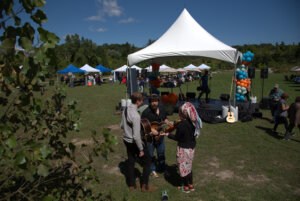
I spoke to the trio on a bench minutes before their final festival performance last Monday, right after they had finished a harmonizing warmup. For these three 20-something artists, Americana is as central to their everyday Jewish practice as putting on tefillin.
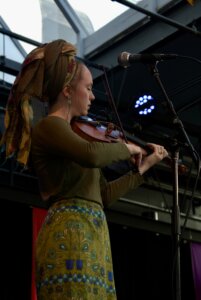
“How we got started was we wanted to take music that comes from the Jewish religious canon and play it the way that we know how to play music,” said Chiarandini, 24. “And our common language is bluegrass.”
Chiarandini and Rockwell were childhood friends who knew each other through the bluegrass scene in southern Connecticut. (Small world!) Chiarandini then met and started performing with Wyner when they were studying together at the Berklee School of Music.
They first performed together as a trio in a New Haven synagogue on Christmas Eve in 2019.
“It was called a ‘Not Christmas concert,’” said Wyner, 28. The band members laughed.
The group grew from three friends with a common interest in bluegrass into a full-fledged band, with a name rooted in Biblical tradition (and decided via an Instagram poll).
Their 2023 debut record, Beit El, is an American roots music album, but the instrumentals also incorporate elements of klezmer, African gospel and electric rock. The album features songs like “Ana b’Koach” and “Karav Hashem,” and it ends with a banjo-heavy cover of Lechad Dodi.
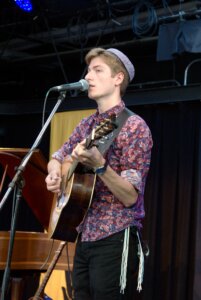
Wyner says the group draws inspiration from American Jewish bluegrass musicians like Andy Statman, David Grisman and Stacy Phillips. But unlike these more Americanized artists, Wyner said, religious Judaism informs every aspect of Jacob’s Ladder’s art.
“We take your Jewish musical roots and our American roots and play music that is truly our identity,” Wyner said. “This is part of our Jewish world.”
Five years since the band formed, Jacob’s Ladder has toured across North America and Israel. They have traveled from Kentucky to California, often performing in synagogues and community centers in different diaspora communities.
Jacob’s Ladder once performed, and then led prayers at a left-leaning Orthodox synagogue in Oakland, California from opposite sides of a mechitza. Another time, they drew in a small, but mighty Jewish community in Nashville, Tennessee.
“People have their own sections and experience the diaspora in so many different ways,” said Wyner.
Forming a band together was also, incidentally, a shidduch. Wyner and Chiarandini got married in 2021. Their baby bounced between their laps during the interview.
Oh, and the reason the band performs mostly in Hebrew, rather than English or Yiddish? To fulfill their mission of uniting Jews of all different denominations and backgrounds.
“The Jewish value that I was raised with that is most important is Ahava Yisrael, or connection of all Jews and love for one another,” explained Rockwell, the band’s 22-year-old banjoist. “ I just want whatever we’re doing to be something that everyone can find a place in.”
A message from our Publisher & CEO Rachel Fishman Feddersen

I hope you appreciated this article. Before you go, I’d like to ask you to please support the Forward’s award-winning, nonprofit journalism so that we can be prepared for whatever news 2025 brings.
At a time when other newsrooms are closing or cutting back, the Forward has removed its paywall and invested additional resources to report on the ground from Israel and around the U.S. on the impact of the war, rising antisemitism and polarized discourse.
Readers like you make it all possible. Support our work by becoming a Forward Member and connect with our journalism and your community.
— Rachel Fishman Feddersen, Publisher and CEO



